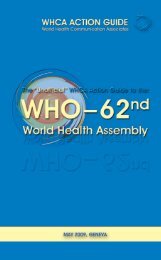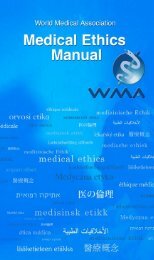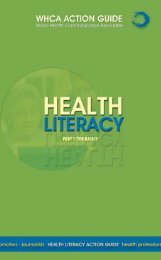the basics - World Health Communication Associates
the basics - World Health Communication Associates
the basics - World Health Communication Associates
- No tags were found...
You also want an ePaper? Increase the reach of your titles
YUMPU automatically turns print PDFs into web optimized ePapers that Google loves.
Kalichman et al. 1999; Wolf et al. 2007; Schillinger et al. 2002). These studies showedthat patients with lower health literacy skills were less able to identify medications,demonstrate proper administration techniques and showed poorer adherence tomedication. In <strong>the</strong> case of people with diabetes, patients were less likely to know<strong>the</strong> appropriate dosing instructions and dietary restrictions, less able to achieve tightblood sugar control and reported higher rates of retinopathy as <strong>the</strong> result of poor selfcare.HIV-infected patients with limited literacy skills have been found to demonstrateless control of <strong>the</strong>ir infection and were less likely to have an undetectable viral load.Higher hospitalisation rates. Patients with limited health literacy havehigher hospitalisation rates and a greater number of emergency room visits (Mancuso& Rincon 2006; Baker et al. 2002).Poorer health. People with low health literacy have been found to betwice as likely to self-report poor health, even after adjusting for age, gender, raceand markers of economic deprivation (Baker et al. 1998). <strong>Health</strong> literacy has beenfound to be a significant, independent predictor of average blood sugar in peoplewith diabetes (measured by serum haemoglobin A1c) (Schillinger et al. 2002). Peoplewith low health literacy had a higher prevalence of diabetes and congestive heartfailure, reported worse physical and mental health and greater difficulties with dailyactivities and limitations due to physical health (Wolf et al. 2005).Higher mortality. Sudore and colleagues (2006) reported that in elderlypeople, low health literacy was associated with greater all-cause mortality riskcompared to those with adequate health literacy. Similarly, Baker et al. (2007) foundlow health literacy to be significantly and independently associated with highermortality risk in elderly people (see Graph 1).4. HIGHER HEALTH CARE COSTS<strong>Health</strong> literacy has a strong economic component. A low level of health literacy canlead to inappropriate use of <strong>the</strong> health care system, reduce effectiveness and efficiencyof health care interventions or increase <strong>the</strong> likelihood of unhealthy lifestyles. Oneanalysis in <strong>the</strong> US, by <strong>the</strong> National Academy on Aging Society, estimates that lowhealth literacy costs <strong>the</strong> US health care system $30-$73 billion annually (1998dollars). Sixty-three percent of <strong>the</strong> additional costs attributed to low health literacymay be borne by public programmes (Friedland 1998).SECTION 2: WHY IS HEALTH LITERACY IMPORTANT? 21






